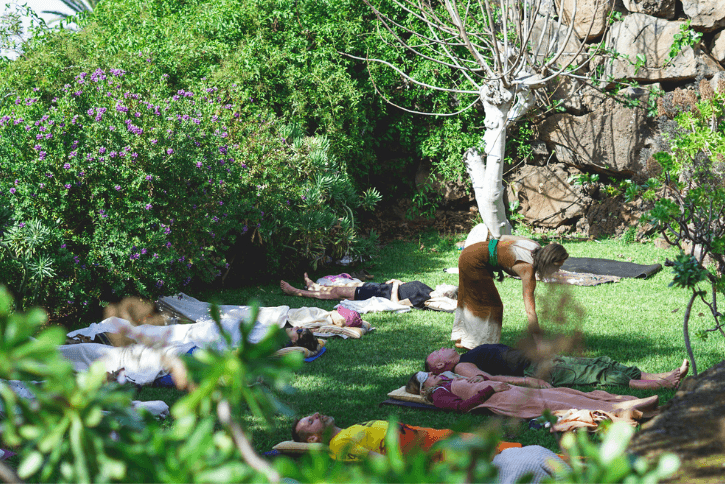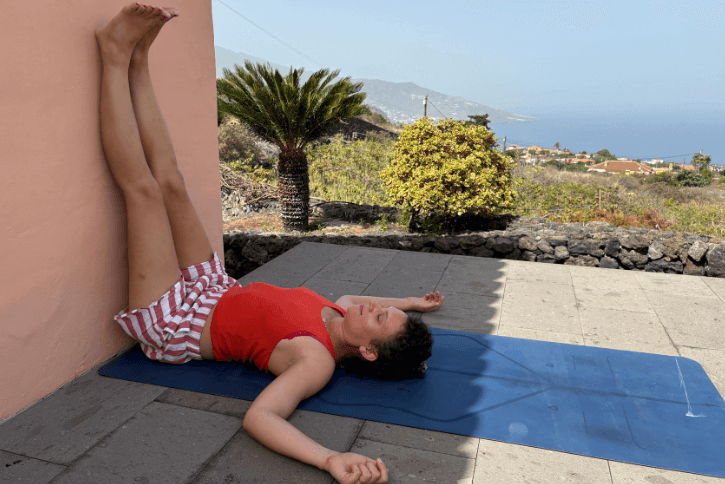Our Yogi Sleep Tips: 9 Ways to Rest Better Forever
- Sarah

- Sep 18, 2025
- 6 min read
Sleep, glorious sleep. We all do it, a lot of it. On average, we will all spend a third of our lives asleep. Isn’t that crazy to think about!
But the question is, why have we become so rubbish at it?
Ask a friend how they’re doing, and chances are they will retort that they’re “tired”. I mean, that’s the standard answer among my friends, but I became a parent last year, and that’s just part and parcel of the role.
Anyhow, I digress. I’ve become fascinated by sleep, why we do it, and what’s going on in our brains when we do.
I study my sleep stats from my watch every morning, lamenting to my husband that I only had 34 minutes of deep sleep. Yes, we’re those people who compare sleep stats. I’m sorry that we’re just so cool.
So I want to share with you some of the fascinating things I’ve discovered about sleep, along with some amazing, and might I add, easy tips on how to do it better. Here goes..
Why do we sleep?
It’s one of the things about the human brain that has fascinated scientists since forever.
They’ve figured out what happens when we sleep, but it’s still a phenomenon that, when you think about it, is quite wild. To just lie down and be in an altered state of consciousness for several hours at a time.

Sleep is the brain’s most important mechanism for healing and recovery. It also helps us to consolidate memories and helps your brain create new pathways that allow you to consolidate new skills.
Now I’m no scientist, so I won’t dive deeper into this aspect, but if you’re interested in the neuroscience of it all, you can check out the book Why We Sleep by Matthew Walker.
What happens to your brain when you sleep?
Many scientists describe sleep as a “cleaning process” for your brain, where fluid washes out any toxins that have accumulated during the day.
Check out this cool picture of the brain from Nicole Vignola: (her book Rewire is INCREDIBLE fyi!)

While more recent research suggests this process also happens while you’re awake, sleeping is a really important part of maintaining a healthy brain.
Anyway, we all know how it feels to be functioning on too little sleep; you’re irritable, can’t think straight, and make bad decisions. So, scientific research or not…it’s pretty clear that good things are happening in the brain when you have a great night’s rest.
Let’s get to the good part…
Our 9 yogi sleep tips for the best rest of your life
Of course, the internet is full of tips for sleeping better, and most of them say the same things…so sorry to break it to you, this won’t be groundbreaking.
BUT they are all tried and tested things we do ourselves and share with our retreat guests to help them sleep better.
1. A bedtime routine
This is for sure the most important one.
I’m currently in the midst of establishing a bedtime routine for my 1-year-old to help her sleep better, and guess what, a bedtime routine shouldn’t stop when you’re an adult!
Winding down before bed is super important for you to fall asleep and stay asleep.

Our brains love routine, and it’s also really important that you try to go to bed and get up at the same time each day so as not to disrupt your circadian rhythm.
What could this bedtime routine include? Here are some ideas:
2. Ditch the tech at least an hour before you go to bed
Ever had a late night scrolling session only to realise once you put the phone down that you’re buzzing and now can’t sleep? The blue light is terrible for your brain, so stop, just stop!
Evict your phone, laptop, and TV from the bedroom. And try to have an hour or so before you sleep to spend time away from the screen. Your brain and body will thank you.
I evicted my phone from the bedroom 7 years ago, and have never looked back. It’s not only your sleep that improves…
3. Get outside every day
Our sleep-wake cycles are regulated by our circadian rhythm, which is also important for regulating everything from our hormone production to digestion.
Light and dark have the biggest influence on your circadian rhythm, so if you get light first thing in the morning, it signals to your brain that it’s time to be awake.

Getting natural light (not artificial) can help regulate your rhythm and make sure you start producing melatonin at the right time to help you wind down for sleep later in the evening.
4. A melatonin boosting moon drink
Melatonin is the hormone your body releases to signal it's time to go to sleep. Our modern lives can interfere with this, and through our sleep/wake cycles or circadian rhythm, completely out of whack.
Many people who have sleep issues take synthetic melatonin to help them wind down, but what if there were natural ingredients that have the same effect?
Enter Mooni, a magical blend of organic herbs, spices, and superfoods that help boost your Melatonin production. Check out that beautiful blend:

Coco spent months perfecting the melatonin boosting blend and now not only shares her concoction with our retreat guests, but with many happy sleepers all over the world.
Maybe you want to write a few words down in your journal about your day, maybe you want to light a candle as you sip your Mooni. Whatever it is, a ritual can make you feel calm and safe, the perfect setup for going to bed.
Make Mooni part of your evening wind-down ritual and reap the benefits of a blissful slumber.
5. Dim the lights, lower the temperature
Making your room conducive to sleep is another important aspect to keep in mind. No bright lights in the bedroom, please (and gentle reminder, NO screens either).
Your body gets confused and can’t produce enough melatonin when the light is bright. So warm, dim light is best.

Did you know that in the evening, your body temperature drops slightly to signal that it’s time to sleep? A cooler room can help you produce the melatonin required to drift off to dreamland.
And once you are asleep, your core body temperature stays slightly lower, so a cool room can help you stay in a deep, restorative sleep. The type you need for those brain benefits we talked about earlier.
Air your room before you get into bed, or if you live in a hot place, have a fan on hand to keep the room cool. Nothing worse than tossing and turning in bed because you’re too hot to sleep.
6. Gentle breathing
Most of us are permanently operating in fight or flight mode. If you want to activate your parasympathetic nervous system (the one responsible for rest and digest) and therefore sleep better, you need to get in touch with the vagus nerve.
How is that done? With breathing slow and steady.
Taking some slow deep breaths where you:
Count the inhalation for 4,
Hold the breath for 7,
Exhale for 8
Repeat 12 times.
This gentle breathing practice activates your parasympathetic nervous system and can help calm your mind and body. Perfect for sleeping.
Give it a try right now.
7. Avoid caffeine and alcohol
This should go without saying, but that late afternoon espresso ain’t helping with your sleep cycles. I’m personally very guilty of drinking coffee or tea too late into the afternoon and then struggling with falling asleep…
I know it’s hard to be disciplined on this, but if you can, switch to herbal teas or Mooni(!) in the afternoon. Your body will thank you.
Alcohol is also the devil when it comes to sleep; it plays havoc with your circadian rhythm and gets totally confused about where you are in your sleep/wake cycle.
Yes, alcohol may make you feel sleepy, but that’s not necessarily a good thing for the quality of your sleep. Your body isn’t sure when to secrete that lovely melatonin stuff we talked about earlier, and overall has a terrible time trying to figure out what it is supposed to be doing.
So as much as having a glass of wine in the evening is nice, if you’re serious about sleep, skip it.
When you come on a retreat with us, we want you to have the most restful sleep of your life! That’s one of the many reasons we don’t serve alcohol at our retreats. You'll get a warm cup of Mooni instead ;-)

8. A warm shower
Research suggests that taking a warm bath or shower before bed can accelerate the lowering of your core body temperature, the exact process you want for falling asleep. How does this work?
The warm water helps to bring your blood to the surface, in turn lowering your core temperature. Body temperature. How cool is that?!
9. Legs up the wall
A final, super simple technique to activate your parasympathetic nervous system and, in turn, help you wind down and relax for sleeping.
Lie on your back and do as it says on the tin! Put your legs up the wall.

Doing this reverses the blood flow back towards your heart which can aid with lymphatic drainage, help reduce swelling and water retention in your legs. All while activating the right nervous system for sleep.
It’s a win-win! We recommend doing it for 3-5 minutes.
Et voila! Sleep hacks, mastered
Those are our tried and tested top tips for an iconic night’s sleep!
We wish you luck. Tell us what you tried and whether you have any incredible tips we missed out.
If you want the most restful night’s sleep of your life, join us at our next retreat.
Or try Mooni! Up to you.
Adios.




Comments